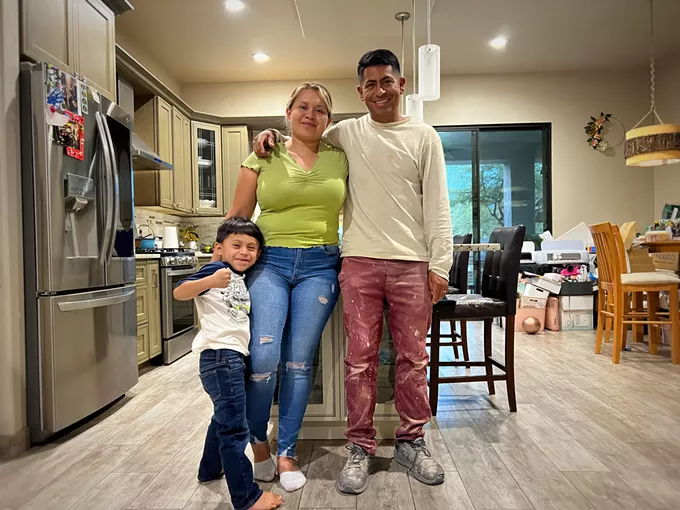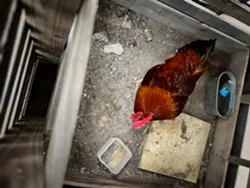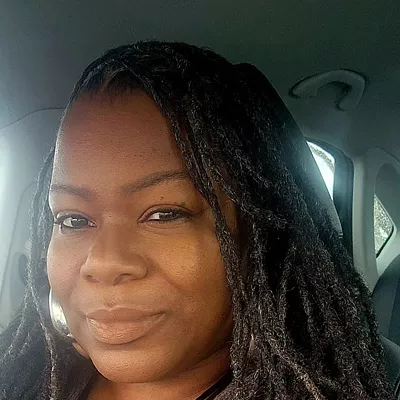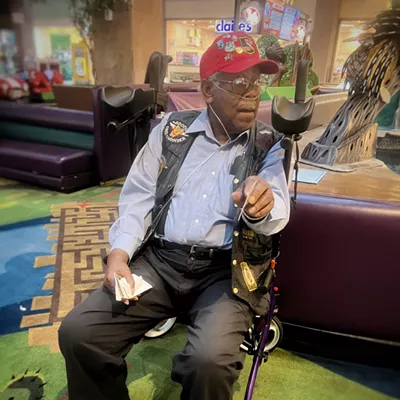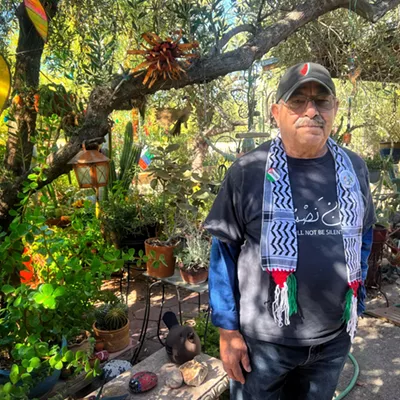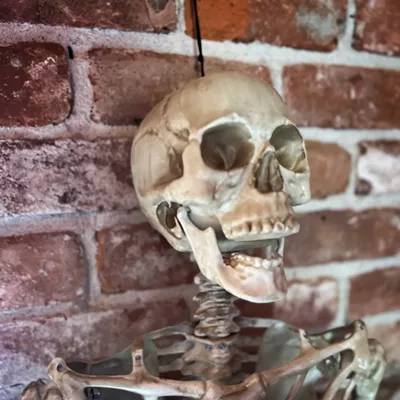Eddy thought for sure he would die. In one hallucination, he saw himself lying next to candles and the Virgin of Guadalupe.
Eddy and his friend had no lights. It was night and starless; nothingness.
The two huddled against each other for a degree of warmth. It began raining, or so they thought. They could only hope they were going in the right direction, trudging in freezing winds through varied landscapes and cactus fields, up climbs, through fences. The icy air stung their bones. Eddy’s hands swelled. Thirty-five miles in, Eddy could no longer walk, the freeze took out his knee and he was forced to hop. His friend grabbed a large stick to pull him along and prevent him from falling over.
Eddy’s friend knew how to get to Green Valley, but they didn’t see it. They were lost. When the sun rose in the morning, what they thought was rain, had been snow. “I couldn’t believe I was alive,” Eddy said.
Eddy doesn’t know exactly where things come from, but he knows they come when you need them. He thinks it is God. They made it another seven hours until they heard Mexican music. They believed it Mexico, that they had traversed a giant circle in hell. But it was a ranch. The owner of this ranch gave them carne asada, soda, water and warmth.
“That was coming from heaven,” Eddy said.
The man drove the pair the remaining miles and dropped them at a corner in Tucson, where they were collected by a relative.
Eddy was 18 then, already an expert at crossing the border from Mexico.
***
Cock-o-doodle-doos erupt at irregular intervals, as if mocking the backyard’s post-monsoon stillness. The rooster takes this August evening somewhere else, somewhere far beyond the stooped powerlines and sweet hum of the waning sun.
The 34-year-old Heriberto “Eddy” Hernandez is sitting at an outdoor table under an expansive portico, flanked by a child’s water-filled inflatable pool. He constructed this porch, the rooster’s pen, as well as the adjacent guest house from the ground up. And room by room, he rebuilt, expanded and refurbished the main house, once a modest cinderblock. The home now boasts airy, open rooms, marble counters and lofty ceilings, and he’s not yet finished. The exterior is coming along — fruit-bearing trees, tiled pathways.
It is situated in central Tucson where nearby houses show a spectrum of care. Whimsical, animal-head mailboxes and humming-bird feeders contrast neglected houses with cars marooned in treeless front yards.
It is a marvel what Eddy has done with their house, like an evolving altar to his wife Maria and their 4-year-old son, Eric. The eye for beauty and autodidactic expertise, the perseverance and the suffering.
Eddy is a brilliant construction factotum in that way he can build or fix anything, plumbing to electrical, interior, exterior. He is in high demand with housing contractors and subcontractors, and other businesses and clients. I’ve seen him at work; he moves fast, efficiently, confident, any challenge appears effortless. It is a gift. He has no business card, is looking to start his own business, but there is a problem with his naturalization and citizenship. His wife and son are U.S. citizens and he is not. Lawyers and benevolent clients have helped, but legal roadblocks remain because he’s been deported back to Mexico many times.
***
Eddy was born into a different kind of life, in a village called La Fortuna, just outside Doctor Mora in Guanajuato, Mexico, northwest of Mexico City. He talks of the “Mexican adobe” of his family home, how they’d dig a hole, put in dirt, water and donkey shit, and use it to build. A roof of asbestos sheets. Eddy was 6 years old when they got electricity and running water. To use a phone meant a walk to the next town. The family’s toilet was holes in an agave forest beyond their house. (“You had to be careful, it was like a mine field!”)
Speaking in his second language, his voice is measured and comforting, like one who has fought hard to balance forces around him. He learned English on his own, and he can converse for hours. He smiles often, sometimes searching Spanish-to-English translations on his phone. His deep brown eyes show no fatigue after a long day’s work. His red jeans, work shoes and pullover shirt claim plaster dust and worksite muck.
He talks at length about family and lineage. His parents married and had 10 children, Eddy the eldest. By age 7, the boy was already working odd jobs, planting broccoli seeds, cleaning yards, whatever he could muster before and after school. He’d buy his own shoes, and then a bed (“11,000 pesos!”) so his siblings weren’t crammed into one. By 11 he was riding his bike on food runs, washing windows at a filling station, picking vegetables, working fruit stands. He never slept much. “I barely had time to eat.”
The parents were grateful for his income, but his dad was strict. “He’d hit us with the belt,” Eddy said. He laughs, “That gave us energy.”
The children all had work to do. If you were sick, Dad figured, you’d sweat it out in the fields. They rose early. Dad raised some of the family’s food — corn, beans. Eddy and his younger brothers took care of the few sheep they owned, hens and roosters, a cow at one point. “Over there,” he said, “most kids have to work at a young age.”
If a child was sick Mom would do teas, home remedies; any doctor visit was rare, too expensive. “My grandmother would help when my mom was pregnant. She’d walk one hour from where she lived. I would wait at the door to see if she would come. Because life is not easy, these things prepared me for what life is.”
***
In Eddy’s backyard, the rooster crows, wind kicks up dust. Eddy looks to the northwest over his fence, “It is so nice out, we can stay out here if you like.” He offers something to drink.
Eddy can only raise his eyebrows, shake his head and occasionally laugh when talking hardships his parents faced.
A preteen cousin killed by a truck while procuring tortillas for his mother. Tragedy ensues at the boy’s burial.
In Mexico, children are rarely spared from the subject of death and often participate in funerals as a celebration of life, and the journey into something new. Following tradition, the family used Cohetes, sort of homemade bottle rockets, to honor. Sparks erupted a nearby pile of fireworks, right next to Eddy’s sister and brother. The two, and a cousin, remained in the hospital for months. His sister and brother survived, but were badly scarred for life.
“My parents stayed in the hospital and we stayed with our grandmother.”
Eddy learned early to believe the idea of “destiny,” if one works hard enough, the betterment of the human condition follows. He also learned as a boy working jobs on the streets about how others treat you. He peppers conversations with little wisdoms. “When you come from nothing and are backed into a corner, that is where it starts.”
He was smart, and squirreled away a little money. His school friends dreamed of America. Eddy romanticized the idea of work, of contribution, of success.
Eddy finished middle-school and picked in a broccoli field. He was small so he suffered. He uses his hands to show how the bag straps tortured his shoulders, how he picked broccoli and deposited it into a truck from a ladder. Once he fell off that ladder and nearly died.
Another time he “would feel something poking at my feet but I would keep going for the money. You need to be running; they pay you for each bag. When I was done I couldn’t put my shoes on because my feet were so swollen. I got home and my mom looked at the bottoms of my feet and cried. When you work you don’t feel it. I could barely handle the weight. It’s really hard when you need money and your body doesn’t respond.”
His boss lost that broccoli field to insects. He said, “‘I am going to America.’ He was 30, I was 14. I said, ‘I want to go.’
“My mom was in the kitchen when I told her. She said, ‘What!’”
I said, “I work here, why not there?”
Mom said tell your dad.
His dad considered maybe Eddy was old enough. “And then he said, ‘Are you sure you want to go? It is very dangerous … you could die.’
“He said, ‘I know you guys want a better life. I gave you what I could.’ And this was the first time I ever saw him cry.”
He phoned an aunt in Tucson. She relented, “I know if I don’t help you, you will look elsewhere.” She agreed to pay the coyote when they arrived in Tucson.
Eddy left home and family and slunk across the U.S./Mexican border in autumn 2003. He was 14. Traveling partners included a 16-year-old cousin and the former broccoli boss. A trip from his hometown to Queretaro in central Mexico led to a 36-hour bus ride to border town Nogales.
His fear mixed with a naïve, boyish spirit of adventure. He was moved by some inner calling for a better life, which would soon exceed a frightened, punished state. He understood life could be better and rallied confidence to fuel the ingenuity to create one worth pursuing.
When he got to Nogales, the coyote to lead them across the border was only 16.
“Now this part is funny,” Eddy said.
This kid coyote was also one in million, a friend from Eddy’s school back in Doctor Mora. Eddy smiles. “It was destiny.”
A van took them to Sasabe. Eddy filled his backpack with food and water. They snuck across the border and began walking the roughly 75 miles at 5 p.m.
After 10 hours, Eddy developed massive blisters on his feet and the fatigue nearly killed him. “You are in the middle of the desert, you have no choice but to keep going. We eat a little but it’s not enough. You have to learn to control the pain.”
They walked all night, all the next day, ditching Border Patrol helicopters by hiding beneath trees.
“Every time I hear a helicopter now I relive (the fear). It really hurts your mind.”
The four arrived, after 29 hours, at Three Points.
He didn’t consider dying, and he wasn’t aware of the tragic immigrant history of the Sonoran land, the thousands of men, women, children who died crossing over.
“I thought it was going to be like a hiking trip, only you run when you hear a car. I didn’t even know what a work visa was.” He pauses, continues, “I think at 17 I learned of others who died.”
When he arrived at his aunt’s house, she didn’t have the money to pay the coyote. Eddy panicked.
His friend said, “'It’s okay, pay me when you can.' My friend was really nice, he helped people get out of poverty.” Eddy then learned the routes to Tucson so coyotes weren’t necessary.
He first got a job washing dishes at a Chinese restaurant. Soon he shared an apartment with Chinese guys from work. “We made our own language, a mix of Chinese, English and Spanish,” he laughs. He bought a bicycle to get around. He spent many days and nights crying, missing his family and parents. “The first six months were the worst. You know you can’t go back, at least not easily.”
A kind uncle put him to work erecting tract homes. He learned framing, but he was still too small for heavy work. At 16 he drove to Kentucky to build chicken farms. He worked in Indiana, Ohio, stayed about a year. “I thought it was really beautiful there.” Kentucky sheriffs caught him; back to Mexico. He went home to see his family.
He stayed in Mexico a couple weeks and returned via the agony — the busses, the crossing, the fright, the starving. He reckons he made that deathly 75-mile walk from Mexico to Tucson about 10 times in his life. “Every time was harder and harder. The first three times we were literally walking on the sides of the road.”
Then the Mexican cartels began to control the border, and “you’d have to pay them to get across.”
***
In 2010, Eddy was on his way to Minnesota for a job. In Nebraska he got caught with no ID, spent a month in jail. A Tucson friend drove up to bond him out and help fight for his case. He was learning the legalities of becoming a U.S. citizen, the voluntary departures, the mistakes he’d made in the past. He pauses to rattle off names of friends who have “helped so much.”
He was deported, but this time it offered a hopeful prospect.
“My plan was to stay in Mexico, get a degree. When I went back it was like a whole different world, except for my family and friends. I feel unsafe in Mexico, the cops are so corrupt, they will ask for money, especially if you look like you just came back from the states.”
He stayed nearly two years, worked for Samsung, and met Maria, his future wife, at her sister’s quinceañera.
“On her 18th birthday in December, I asked her to be my girlfriend.” He knew Maria, four years his junior, had suffered kidney problems.
Months later, Maria got a green card with help from her father, for permanent U.S. residency and came to Tucson. That destiny thing, Eddy said.
Love for Maria, and Tucson, pulled him back. “Tucson is where I’ve been most of my life, and I love it.”
In 2012, he crossed for the last time.
He and his brother were literally carrying a dying Guatemalan man. The trio stumbled across a dead body in the desert. Eddy and his brother were horrified, but tried to shield the Guatemalan, the last thing he needed. By some miracle the man survived.
***
Back in Tucson, reunited with Maria, a friend posted a Craigslist ad for a handyman on Eddy’s behalf. He got calls, made mistakes early on, but that kickstarted what has become a successful career.
He found work with contractors, some full of it about their skill level or how much they’d make off labor from Eddy and others like him. Others have been honest, good teachers. He studied myriad YouTube videos and gleaned much from the “crazy house flippers, because every house was different.”
His mind gained clarity. The quick study absorbed everything in these years — from reading building plans and mastering plumbing and electrical, to metalwork and roofing, to painting and concrete pouring. “I learned more by fixing mistakes on new houses than I did building,” he said, half-laughing. “Every contractor looks for the cheapest labor. Now, when something goes wrong, they call me.”
***
Inside the house, Eric’s attention is drawn to colorful images on a sizable flat screen. His art decorates a freshly painted hallway. Maria is in the kitchen getting ready to put Eric to bed.
Her life has seen painful kidney problems, transplants and rejections. Maria has insurance, yes, but money is hard. There are specialists, nutritionists, long hospital stays, tests.
Eddy comes to tears talking of her pain, down to how he’d unplug and plug in the dialysis machine so she can use the bathroom at night. The complications during the pregnancy.
“The way she looks when she’s sick, the high fevers,” he said. “The first kidney transplant, she lost it because of an infection.”
Three years ago, she received a second transplant, which appears successful. Things are somewhat better now; no dialysis, at least.
“She tries so hard. She is always happy, she’s always laughing.” He stops, adds softly, “That’s an amazing life right there.”
It is dark out and soon Eddy is closing the big safety gate to their yard, home and work trucks. Before I leave he tells me they are trying for another baby. But I can sense he is a little scared, of a lot of things. And then he waves goodbye.
Brian Smith's collection of essays and stories, Tucson Salvage: Tales and Recollections of La Frontera, based on this column, is available now worldwide on Eyewear Press UK. Buy the collection in Tucson at Antigone Books, 411 N. Fourth Ave. You can also pickup his collection of short stories, Spent Saints (Ridgeway Press).

